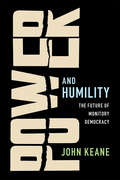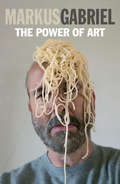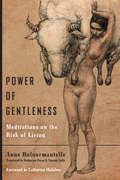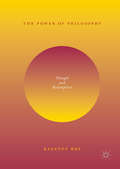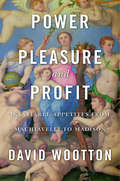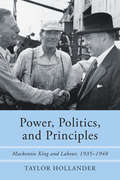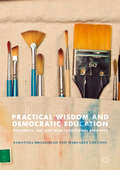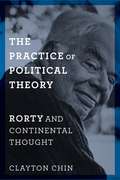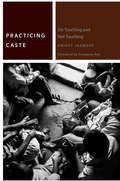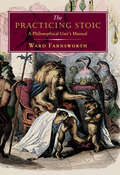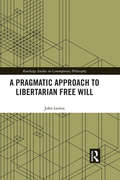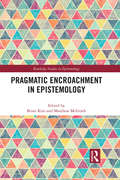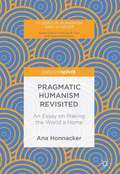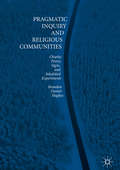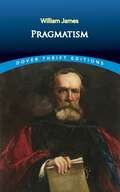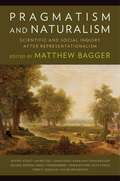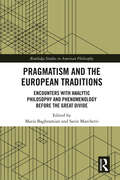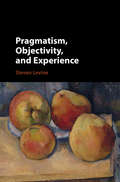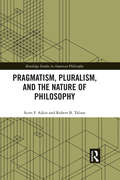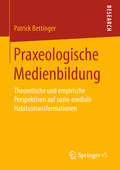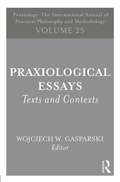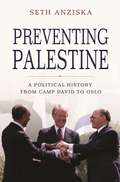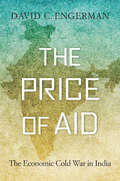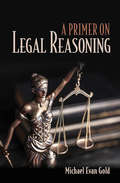- Table View
- List View
Power and Humility: The Future of Monitory Democracy
by John KeaneDemocracy urgently needs re-imagining if it is to address the dangers and opportunities posed by current global realities, argues leading political thinker John Keane. He offers an imaginative, radically new interpretation of the twenty-first-century fate of democracy. The book shows why the current literature on democracy is failing to make sense of many intellectual puzzles and new political trends. It probes a wide range of themes, from the growth of cross-border institutions and capitalist market failures to the greening of democracy, the dignity of children and the anti-democratic effects of everyday fear, violence and bigotry. Keane develops the idea of 'monitory democracy' to show why periodic free and fair elections are losing their democratic centrality; and why the ongoing struggles by citizens and their representatives, in a multiplicity of global settings, to humble the high and mighty and deal with the dangers of arbitrary power, force us to rethink what we mean by democracy and why it remains a universal ideal.
The Power of Art
by Markus GabrielWe live in an era of aesthetics. Art has become both pervasive and powerful – it is displayed not only in museums and galleries but also on the walls of corporations and it is increasingly fused with design. But what makes art so powerful, and in what does its power consist? According to a widespread view, the power of art – its beauty – lies in the eye of the beholder. What counts as art appears to be a function of individual acts of evaluation supported by powerful institutions. On this account, the power of art stems from a force that is not itself aesthetic, such as the art market and the financial power of speculators. Art expresses, in a disguised form, the power of something else – like money – that lies behind it. In one word, art has lost its autonomy. In this short book, Markus Gabriel rejects this view. He argues that art is essentially uncontrollable. It is in the nature of the work of art to be autonomous to such a degree that the art world will never manage to overpower it. Ever since the cave paintings of Lascaux, art has taken hold of the human mind and implemented itself in our very being. Thanks to the emergence of art we became human beings, that is, beings who lead their lives in light of an image of the human being and its position in the world and in relation to other species. Due to its structural, ontological power, art itself is and remains radically autonomous. Yet, this power is highly ambiguous, as we cannot control its unfolding. In this book, a leading proponent of New Realism applies this philosophical perspective to art to create a new aesthetic realism.
Power of Gentleness: Meditations on the Risk of Living
by Anne Dufourmantelle Katherine Payne Vincent Sallé Catherine MalabouGentleness is an enigma. Taken up in a double movement of welcoming and giving, it appears on the threshold of passages signed off by birth and death. Because it has its degrees of intensity, because it is a symbolic force, and because it has a transformative ability over things and beings, it is a power. The simplicity of gentleness is misleading. It is an active passivity that may become an extraordinary force of symbolic resistance and, as such, become central to both ethics and politics. Gentleness is a force of secret life-giving transformation linked to what the ancients called potentiality.In our day, gentleness is sold to us under its related form of diluted mawkishness. By infantilizing it our era denies it. This is how we try to overcome the high demands of its subtlety—no longer by fighting it, but by enfeebling it. Language itself is therefore perverted: what our society intends to give the human beings that it crushes “gently,” it does in the name of the highest values: happiness, truth, security.From listening to those who come to me and confide their despair, I have heard it expressed in every lived experience. I have felt its force of resistance and its intangible magic. In mediating its relation to the world, it appears that its intelligence carries life, saves and amplifies it.
The Power of Philosophy: Thought And Redemption
by Kaustuv RoyThis book explores the possibility of philosophical praxis by weaving an ontological thread through four principal thinkers: Heidegger, Schelling, Goethe, and Heraclitus. It argues that a special kind of redemptive power awaits the structural understanding of thought that is beyond semantic formations such as concepts and ideational systems. The author claims that the “power” is negative in nature, trans-personal, and derived directly from the understanding of thought as a structural pulse. The book travels backwards in time, encountering successively Heidegger’s critique of calculative thinking, Schelling’s Mind/Nature relation, Goethe’s Delicate Empiricism, and the aphoristic wisdom of Heraclitus in search of a redemptive power that lies in the self-knowledge of thought. This power is ontological and not historical or developmental; it is the same at all times and all points of history. The author refers to the praxis as “philosophical bilingualism.”
Power, Pleasure, and Profit: Insatiable Appetities from Machiavelli to Madison
by David WoottonDavid Wootton guides us through four centuries of Western thought to show how new ideas about politics, ethics, and economics stepped into a gap opened up by religious conflict and the Scientific Revolution. As ideas about godliness and Aristotelian virtue faded, theories about the rational pursuit of power, pleasure, and profit moved to the fore.
Power, Politics, and Principles: Mackenzie King and Labour, 1935-1948 (G - Reference, Information and Interdisciplinary Subjects)
by Taylor HollanderSet against the backdrop of the U.S. experience, Power, Politics, and Principles uses a transnational perspective to understand the passage and long term implications of a pivotal labour law in Canada. Utilizing a wide array of primary materials and secondary sources, Hollander gets to the root of the policy-making process, revealing how the making of P.C. 1003 in 1944, a wartime order that forced employers to the collective bargaining table, involved real people with conflicting personalities and competing agendas. Each chapter of Power, Politics, and Principles begins with a quasi-fictional vignette to help the reader visualize historical context. Hollander pays particular attention to the central role that Mackenzie King played in the creation of P.C. 1003. Although most scholars describe the Prime Minister’s approach to policy decisions as calculating and opportunistic, Power, Politics, and Principles argues that Mackenzie King’s adherence to moderate principles resulted in a less hostile legal environment in Canada for workers and their unions in the long run, than a more far-reaching collective bargaining law in the United States.
Practical Wisdom and Democratic Education: Phronesis, Art And Non-traditional Students
by Margaret Gregson Samantha BroadheadThis book explores the development of practical wisdom, or phronesis, within the stories of four mature students studying for degrees in art and design. Through an analysis informed by the ideas of Basil Bernstein and Aristotle, the authors propose that phronesis – or the ability to deliberate well – should be an intrinsic part of a democratic education. As a number of vocational and academic disciplines require deliberation and the ability to draw on knowledge, character and experience, it is essential that no student feels their experience puts them at a disadvantage. The authors argue that democratic education should allow each participant to feel enhanced, included and able to participate in order to create a constructive and reciprocal dialogue. This work will be of value to students and scholars interested in democratic education, the experiences of non-traditional students, and the sociology of education.
The Practice of Political Theory: Rorty and Continental Thought (New Directions in Critical Theory #60)
by Clayton ChinRecent political thought has grappled with a crisis in philosophical foundations: how do we justify the explicit and implicit normative claims and assumptions that guide political decisions and social criticism? In The Practice of Political Theory, Clayton Chin presents a critical reconstruction of the work of Richard Rorty that intervenes in the current surge of methodological debates in political thought, arguing that Rorty provides us with unrecognized tools for resolving key foundational issues.Chin illustrates the significance of Rorty’s thought for contemporary political thinking, casting his conception of “philosophy as cultural politics” as a resource for new models of sociopolitical criticism. He juxtaposes Rorty’s pragmatism with the ontological turn, illuminating them as alternative interventions in the current debate over the crisis of foundations in philosophy. Chin places Rorty in dialogue with continental philosophy and those working within its legacy. Focused on both important questions in pragmatist scholarship and central issues in contemporary political thought, The Practice of Political Theory is an important response to the vexed questions of justification and pluralism.
Practicing Caste: On Touching and Not Touching (Commonalities)
by Aniket Jaaware Anupama RaoPracticing Caste attempts a fundamental break from the tradition of caste studies, showing the limits of the historical, sociological, political, and moral categories through which it has usually been discussed. Engaging with the resources that phenomenology, structuralism, and poststructuralism offer to our thinking of the body, Jaaware helps to illuminate the ethical relations that caste entails, especially around its injunctions concerning touching. The resulting insights offer new ways of thinking about sociality that are pertinent not only to India but also to thinking the common on a planetary basis.
The Practicing Stoic: A Philosophical User's Manual
by Ward FarnsworthStoicism is the most helpful and practical philosophy ever devised. Its intention is to help people find happiness by thinking differently about their lives and their problems. The advice the Stoics provided centuries ago is still the best anyone has offered, and it’s as useful today as it was then—or more. When anyone today says something really wise, the Stoics usually said it first. Today the word “stoicism” is often used to mean suffering without complaint, but the true ideas, and ideals, of the Stoics are far more powerful and interesting. Stoicism means knowing the difference between what we can control and we can’t, and not worrying about the latter. The Stoics were masters of perspective, always taking the long view while remembering that life is short. And they were deep and insightful students of human nature, understanding how we manage to make ourselves miserable as well as how we seek and can find fulfillment. The great insights of the Stoics are spread over a wide range of ancient sources. This book brings them all together for the first time. It systematically presents what the various Stoic philosophers said on every important topic, accompanied by an eloquent commentary that is clear and concise. The result is a set of philosophy lessons for everyone—the most valuable wisdom of ages past made available for our times, and for all time.
A Pragmatic Approach to Libertarian Free Will (Routledge Studies in Contemporary Philosophy)
by John LemosA Pragmatic Approach to Libertarian Free Will argues that the kind of free will required for moral responsibility and just desert is libertarian free will. It is a source of great controversy whether such a libertarian view is coherent and whether we should believe that we have such free will. This book explains and defends Robert Kane’s conception of libertarian free will while departing from it in certain key respects. It is argued that a suitably modified Kanean model of free will can be shown to be conceptually coherent. In addition, it is argued that while we lack sufficient epistemic grounds supporting belief in the existence of libertarian free will, we may still be justified in believing in it for moral reasons. As such, the book engages critically with the works of a growing number of philosophers who argue that we should jettison belief in the existence of desert-grounding free will and the practices of praise and blame and reward and punishment which it supports.
Pragmatic Encroachment in Epistemology (Routledge Studies in Epistemology)
by Brian Kim Matthew McGrathAccording to philosophical lore, epistemological orthodoxy is a purist epistemology in which epistemic concepts such as belief, evidence, and knowledge are characterized to be pure and free from practical concerns. In recent years, the debate has focused narrowly on the concept of knowledge and a number of challenges have been posed against the orthodox, purist view of knowledge. While the debate about knowledge is still a lively one, the pragmatic exploration in epistemology has just begun. This collection takes on the task of expanding this exploration into new areas. It discusses how the practical might encroach on all areas of our epistemic lives from the way we think about belief, confidence, probability, and evidence to our ideas about epistemic value and excellence. The contributors also delve into the ramifications of pragmatic views in epistemology for questions about the value of knowledge and its practical role. Pragmatic Encroachment in Epistemology will be of interest to a broad range of epistemologists, as well as scholars working on virtue theory and practical reason.
Pragmatic Humanism Revisited: An Essay on Making the World a Home (Studies in Humanism and Atheism)
by Ana HonnackerHow can we feel at home in this world without clinging to false certainties? This book offers a humanist re-reading of philosophical pragmatism and explores its potentials for a worldview that relies only on human resources. Thinking along with authors like William James and F.C.S. Schiller, it highlights a fundamentally humanist strand of pragmatism aimed at fostering human creativity and transformative action. It is grounded in everyday experience and underlines our responsibility to strive for the better. Ana Honnacker traces perspectives on science, religion, and ethics in the light of a pragmatic understanding of humanism. Furthermore, she suggests how to address the existential challenges we face today. Thus, pragmatic humanism is explored not only as a philosophy for critical minds, but also as a way of life.
Pragmatic Inquiry and Religious Communities: Charles Peirce, Signs, and Inhabited Experiments
by Brandon Daniel-HughesThis book examines the ways in which religious communities experimentally engage the world and function as fallible inquisitive agents, despite frequent protests to the contrary. Using the philosophy of inquiry and semiotics of Charles Sanders Peirce, it develops unique naturalist conceptions of religious meaning and ultimate orientation while also arguing for a reappraisal of the ways in which the world’s venerable religious traditions enable novel forms of communal inquiry into what Peirce termed “vital matters.” Pragmatic inquiry, it argues, is a ubiquitous and continuous phenomenon. Thus, religious participation, though cautiously conservative in many ways, is best understood as a variety of inhabited experimentation. Religious communities embody historically mediated hypotheses about how best to engage the world and curate networks of semiotic resources for rendering those engagements meaningful. Religions best fulfill their inquisitive function when they both deploy and reform their sign systems as they learn better to engage reality.
Pragmatism: A New Name For Some Old Ways Of Thinking (Dover Thrift Editions)
by William JamesA profoundly influential figure in American psychology, William James (1842–1910) was also a philosopher of note, who used Charles S. Peirce's theories of pragmatism as a basis for his own conception of that influential philosophy. For James, this meant an emphasis on "radical empiricism" and the concept that the meaning of any idea — philosophical, political, social, or otherwise — has validity only in terms of its experiential and practical consequences. <P><P> James propounded his theories of pragmatism in this book, one of the most important in American philosophy. In a sense, he wished to test competing systems of thought in the "marketplace of actual experience" to determine their validity, i.e. whether adopting a particular philosophical theory or way of looking at the world makes an actual difference in individual conduct or in how we perceive and react to the varieties of experience. In these pages, James not only makes a strong case for his own ideas, but mounts a powerful attack against the transcendental and rationalist tradition. <P><P> For anyone interested in William James or the history of American philosophical thought, Pragmatism is an essential and thought provoking reference. In this handy, inexpensive edition, it will challenge and stimulate any thinking person.
Pragmatism and Naturalism: Scientific and Social Inquiry After Representationalism
by Matthew C. Bagger Scott Davis Professor Nancy Frankenberry Terry Godlove Jonathon Kahn Philip Kitcher Wayne Proudfoot Michael Raposa Jeffrey Stout Jim WetzelMost contemporary philosophers would call themselves naturalists, yet there is little consensus on what naturalism entails. Long signifying the notion that science should inform philosophy, debates over naturalism often hinge on how broadly or narrowly the terms nature and science are defined. The founding figures of American Pragmatism—C. S. Peirce (1839–1914), William James (1842–1910), and John Dewey (1859–1952)—developed a distinctive variety of naturalism by rejecting reductive materialism and instead emphasizing social practices. Owing to this philosophical lineage, pragmatism has made original and insightful contributions to the study of religion as well as to political theory.In Pragmatism and Naturalism, distinguished scholars examine pragmatism’s distinctive form of nonreductive naturalism and consider its merits for the study of religion, democratic theory, and as a general philosophical orientation. Nancy Frankenberry, Philip Kitcher, Wayne Proudfoot, Jeffrey Stout, and others evaluate the contribution pragmatism can make to a viable naturalism, explore what distinguishes pragmatic naturalism from other naturalisms on offer, and address the pertinence of pragmatic naturalism to methodological issues in the study of religion. In parts dedicated to historical pragmatists, pragmatism in the philosophy and the study of religion, and pragmatism and democracy, they display the enduring power and contemporary relevance of pragmatic naturalism.
Pragmatism and the European Traditions: Encounters with Analytic Philosophy and Phenomenology before the Great Divide (Routledge Studies in American Philosophy)
by Sarin Marchetti Maria BaghramianThe turn of the twentieth century witnessed the birth of two distinct philosophical schools in Europe: analytic philosophy and phenomenology. The history of 20th-century philosophy is often written as an account of the development of one or both of these schools, as well as their overt or covert mutual hostility. What is often left out of this history, however, is the relationship between the two European schools and a third significant philosophical event: the birth and development of pragmatism, the indigenous philosophical movement of the United States. Through a careful analysis of seminal figures and central texts, this book explores the mutual intellectual influences, convergences, and differences between these three revolutionary philosophical traditions. The essays in this volume aim to show the central role that pragmatism played in the development of philosophical thought at the turn of the twentieth century, widen our understanding of a seminal point in the history of philosophy, and shed light on the ways in which these three schools of thought continue to shape the theoretical agenda of contemporary philosophy.
Pragmatism, Objectivity, and Experience
by Steven LevineIn this book Steven Levine explores the relation between objectivity and experience from a pragmatic point of view. Like many new pragmatists he aims to rehabilitate objectivity in the wake of Richard Rorty's rejection of the concept. But he challenges the idea, put forward by pragmatists like Robert Brandom, that objectivity is best rehabilitated in communicative-theoretic terms - namely, in terms that can be cashed out by capacities that agents gain through linguistic communication. Levine proposes instead that objectivity is best understood in experiential-theoretic terms. He explains how, in order to meet the aims of the new pragmatists, we need to do more than see objectivity as a norm of rationality embedded in our social-linguistic practices; we also need to see it as emergent from our experiential interaction with the world. Innovative and carefully argued, this book redeems and re-actualizes for contemporary philosophy a key insight developed by the classical pragmatists.
Pragmatism, Pluralism, and the Nature of Philosophy (Routledge Studies in American Philosophy)
by Scott F. Aikin Robert B. TalisseFor the past fifteen years, Aikin and Talisse have been working collaboratively on a new vision of American pragmatism, one which sees pragmatism as a living and developing philosophical idiom that originates in the work of the "classical" pragmatisms of Charles Peirce, William James, and John Dewey, uninterruptedly develops through the later 20th Century pragmatists (C. I. Lewis, Wilfrid Sellars, Nelson Goodman, W. V. O. Quine), and continues through the present day. According to Aikin and Talisse, pragmatism is fundamentally a metaphilosophical proposal – a methodological suggestion for carrying inquiry forward amidst ongoing deep disagreement over the aims, limitations, and possibilities of philosophy. This conception of pragmatism not only runs contrary to the dominant self-understanding among cotemporary philosophers who identify with the classical pragmatists, it also holds important implications for pragmatist philosophy. In particular, Aikin and Talisse show that their version of pragmatism involves distinctive claims about epistemic justification, moral disagreement, democratic citizenship, and the conduct of inquiry. The chapters combine detailed engagements with the history and development of pragmatism with original argumentation aimed at a philosophical audience beyond pragmatism.
Praxeologische Medienbildung: Theoretische und empirische Perspektiven auf sozio-mediale Habitustransformationen
by Patrick BettingerIn diesem Buch werden Aspekte einer praxeologisch ausgerichteten und empirisch fundierten Medienbildungstheorie skizziert, die das Zusammenspiel von Menschen und medialen Artefakten in Bildungsprozessen eingehend beleuchten. Medienbildung wird hierbei als ein Transformationsprozess verstanden, der sich durch das Wechselverhältnis von personalem Habitus und ‚Quasi-Habitus’ medialer Artefakte auszeichnet. Anhand einer fallübergreifenden Perspektive auf Grundlage der dokumentarischen Analyse biografisch-narrativer Interviews sowie medialer Artefakte werden drei Varianten sozio-medialer Habituskonfigurationen identifiziert, die Bildungsprozesse in jeweils spezifischer Weise prägen.
Praxiological Essays: Texts and Contexts (Praxiology)
by Wojciech W. GasparskiThe 25th volume in the series Praxiology: The International Annual of Practical Philosophy and Methodology brings a praxiological perspective to current issues facing our society. In sixteen brand-new essays, a team of international scholars expands praxiology beyond the borders of its historically philosophical application and uses it to address real-world problems in a variety of fields. The volume outlines new approaches and reflections on traditional praxiological method, and then applies these developments as tools in fields as diverse as ethics, psychology, sociology, economics, management, and entrepreneurship. Grounded in the tradition of the Polish praxiologist Tadeusz Kotarbiński (1886-1981), the 25th volume, entitled Praxiological Essays: Texts and Contexts, highlights the rich mosaic of issues perceived in the practice of human action, and carries a tradition of Praxiological inquiry forward into our contemporary philosophy, methodology, and social sciences.
Preventing Palestine: A Political History from Camp David to Oslo
by Seth AnziskaOn the fortieth anniversary of the Camp David Accords, a groundbreaking new history that shows how Egyptian-Israeli peace ensured lasting Palestinian statelessnessFor seventy years Israel has existed as a state, and for forty years it has honored a peace treaty with Egypt that is widely viewed as a triumph of U.S. diplomacy in the Middle East. Yet the Palestinians—the would-be beneficiaries of a vision for a comprehensive regional settlement that led to the Camp David Accords in 1978—remain stateless to this day. How and why Palestinian statelessness persists are the central questions of Seth Anziska’s groundbreaking book, which explores the complex legacy of the agreement brokered by President Jimmy Carter.Based on newly declassified international sources, Preventing Palestine charts the emergence of the Middle East peace process, including the establishment of a separate track to deal with the issue of Palestine. At the very start of this process, Anziska argues, Egyptian-Israeli peace came at the expense of the sovereignty of the Palestinians, whose aspirations for a homeland alongside Israel faced crippling challenges. With the introduction of the idea of restrictive autonomy, Israeli settlement expansion, and Israel’s 1982 invasion of Lebanon, the chances for Palestinian statehood narrowed even further. The first Intifada in 1987 and the end of the Cold War brought new opportunities for a Palestinian state, but many players, refusing to see Palestinians as a nation or a people, continued to steer international diplomacy away from their cause.Combining astute political analysis, extensive original research, and interviews with diplomats, military veterans, and communal leaders, Preventing Palestine offers a bold new interpretation of a highly charged struggle for self-determination.
The Price of Aid: The Economic Cold War in India
by David C. EngermanThis study of US and Soviet aid efforts in India during the Cold War &“makes a major contribution towards a necessary discussion of the politics of aid&” (Times Higher Education). Debates over foreign aid are often strangely ahistorical. Economists argue about how to make aid work while critics bemoan money wasted on corruption, ignoring the fundamentally political character of aid. The Price of Aid turns the standard debate on its head. By exposing the geopolitical calculus underpinning development assistance, it also exposes its costs. India stood at the center of American and Soviet aid competition throughout the Cold War, as both superpowers saw developmental aid as a way of pursuing their geopolitical goals by economic means. Drawing on recently declassified files from seven countries, David Engerman shows how Indian leaders used Cold War competition to win battles at home, eroding the Indian state in the process. As China spends freely in Africa, the political stakes of foreign aid are rising once again.&“A superb, field-changing book . . . A true classic.&” —Sunil Amrith
A Primer for Star Gazers
by Henry M. NeelyA beginner’s book on astronomy, which should enable anyone to locate the various constellations. Primer for Star Gazers explains in simple pictures and directions, with brief consideration to fixed stars, the northern sky and the planets. It includes a star calendar.“This book is an effort to rescue the ancient love of simple star-gazing from the avalanche of mathematics and physics under which modern astronomy threatens to bury it.”—Henry M. Neely“For the absolute amateur, who does not want too scientific a study but does want to be able to recognize the principal stars and constellations”—Kirkus Review
A Primer on Legal Reasoning
by Michael Evan GoldAfter years of teaching law courses to undergraduate, graduate, and law students, Michael Evan Gold has come to believe that the traditional way of teaching – analysis, explanation, and example – is superior to the Socratic Method for students at the outset of their studies.In courses taught Socratically, even the most gifted students can struggle, and many others are lost in a fog for months. Gold offers a meta approach to teaching legal reasoning, bringing the process of argumentation to the fore.Using examples both from the law and from daily life, Gold's book will help undergraduates and first-year law students to understand legal discourse. The book analyzes and illustrates the principles of legal reasoning, such as logical deduction, analogies and distinctions, and application of law to fact, and even solves the mystery of how to spot an issue.In Gold's experience, students who understand the principles of analytical thinking are able to understand arguments, to evaluate and reply to them, and ultimately to construct sound arguments of their own.
